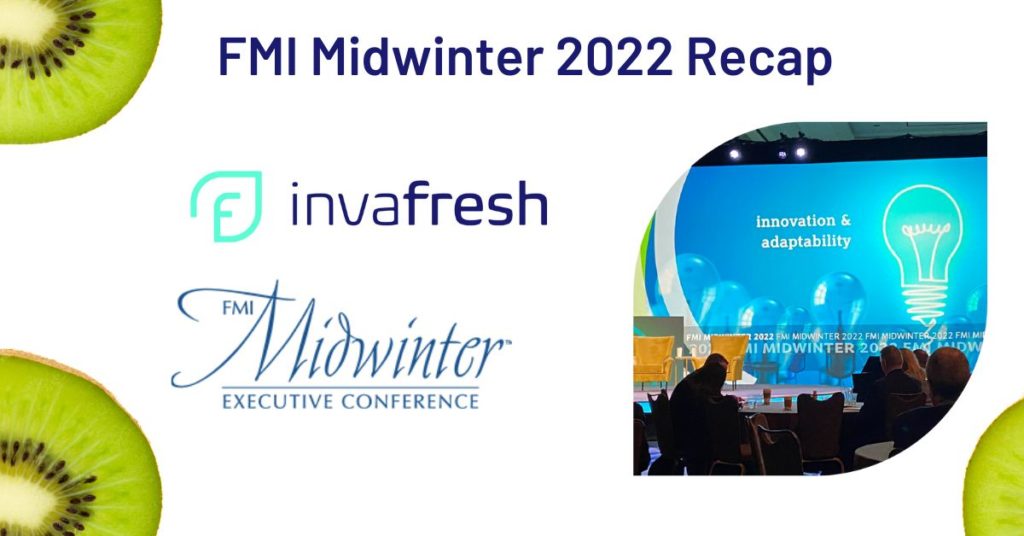
It was great to connect with everyone at the FMI Midwinter Conference in Orlando last week. And it was particularly special as for many of us it was the first in-person event in over two years. Midwinter reinforced what we already knew… that in person meetings are far more engaging than the banality of Zoom calls. Even if it did mean having to fit into suitable business attire after two years of “work from home” gear!
Reflecting upon our time at Midwinter, there were three key takeaways:
- New challenges facing grocery retailers
- Innovation and adaptability are key
- Consumer preferences have shifted
New Challenges Facing Grocery Retailers
No doubt the pandemic placed grocery retailers and their employees on the front line. Throughout the pandemic, grocery retailers were really our North Star. When we were concerned about health and safety, they raised their hands and went to work to make sure we were able to put food on our family tables.
While the pandemic might not be over, we are learning to live with the various mutations of the virus in order to prevent a start and stop approach to the economy. And that brings us to the “long tail” of Covid-19 as we battle new challenges such as labor shortages, inflation, and supply chain disruptions. While one could argue some of these challenges were inevitable regardless of the virus, they have been exacerbated by the pandemic.
Each of these challenges was a key theme and much discussed last week at Midwinter as grocery retailers look to navigate these issues and mitigate the associated risks.
So, let’s focus on one of these challenges (and the other two we will cover in future blog posts).
Inflation. It’s impacting most aspects of our daily lives. When it comes to grocery retailers, we are seeing some significant double digit increases in the meat category… beef is up 17% year-over-year, pork 14%, and chicken 10%. In general, food is up 7.4% year-over-year. With interest rates forecast to continue to rise, there is no near-term reprieve to increasing prices.
Grocery retailers need to look at effective means to navigate the financial pressures that increasing prices places on their margin run operations. The ability to accurately forecast changing consumer purchase habits becomes critical in order to maintain low shrink levels and avoid expensive waste.
Invafresh can help inflation proof your fresh operations through our Intelligent Forecasting Engine. Invafresh will be co-hosting a webinar with FMI on April 28 titled “Price Check: Inflation Proofing Your Fresh Operations“. Joe Smirlies, Senior Vice President of Product at Invafresh and Rick Stein, Vice President of Fresh at FMI will address the impact that inflation is having on grocery retailers and what steps they can take to combat soaring prices to win in Fresh.
Innovation and Adaptability Key
The grocery retail industry is changing. And technology is driving that change. Digital transformation, omnichannel fulfillment, advanced automation, artificial intelligence, machine learning, self-service checkout, data science, big data… The list goes on.
It is clear the pandemic mainstreamed the usage of technology for many consumers, forcing grocery retailers to explore how technology can help them optimize their operations and ensure customer loyalty.
The key for grocery retailers is to continuously seek ways to innovate and adapt to the changing landscape. According to The Hartman Group, who presented at Midwinter, 81% of grocery retailers were examining their digital experience and 66% were focused on enhancing self-service options for their customers.
Omnichannel fulfillment was also a common topic discussed at Midwinter last week. According to a Boston Consulting Group session at the conference, eCommerce has grown 30% due to Covid-19. A steep reduction in delivery times (days to minutes) is a prime example of how technology adoption is driving consumer expectations and why grocery retailers need to be innovative in how they view their operations.
At the heart of this innovation is the need to properly forecast and manage inventory. Gone are the days of spreadsheets and gut checks. Today’s grocery retail environment demands the accuracy of intelligent forecasting in order to optimize operations and meet customer expectations. Technology needs to augment employee driven processes, to free them of mundane tasks and allow them to focus on higher value operations.
Consumer Preferences Shifted
A common theme at Midwinter last week the conference was the evolving attitudes of consumers. While some of this was accelerated by the pandemic, many of these changes were taking hold prior to 2020. The growing focus on plant-based food alternatives, increased attention to healthy eating choices, and sustainability to name a few.
FMI plans to add to their “Power of…” research series with the addition of “The Power of Plant-Based Foods” in early Summer 2022. A clear indication that plant-based foods should no longer be considered a fringe item by grocery retailers.
One change resulting from the pandemic is how people view food. Over the past two years, there was an 88% increase in home cooking as eating out was not an available option. While it is not great news for the hospitality industry and restaurants will start to get busy again as COVID restrictions are lifted, home cooking is here to stay. This has led to grocery retailers needing to adapt to this new dynamic with 64% of them now offering family meal solutions to address this home cooking trend.
Partly a result of home cooking, health & wellness has also gained increasing traction amongst consumers. FMI’s report “The Food as Medicine Opportunity in Food Retail” highlights four key areas:
- Encourage Health & Well-Being
- Improve Nutrition Security
- Disease Management and Treatment
- Promote Food Safety
Many grocery retailers are prioritizing programs for customers that align with the definition of Food as Medicine, even if they are not specifically referring to them as Food as Medicine efforts. Programs include medically tailored meal offerings, rebates for healthy alternative foods, nutrition attribute labeling, and personalized nutrition communications to customers.
From the meetings, topics, and conversations held at Midwinter, it is clear there is a deep-rooted passion for service and the customer experience. Regardless of industry challenges, one thing for certain is that the grocery industry is a people first business. Vibrant and committed to serving their customers and the communities in which they live.
Invafresh was proud to be a Premier Sponsor of FMI Midwinter and we look forward to FMI FreshForward this August in Denver.
Contact
Stephen Midgley
Vice President, Marketing
[email protected]
1.778.558.6067






